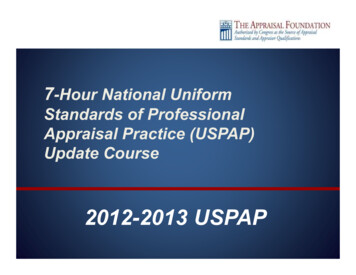
Transcription
0/ 154
FEARLESS MATHA Guide For Real Estate AgentsByGeoffrey Thompson and Rich LinkemerAPPALLASO PRESSPublished by Appallaso PublishingRevised 11-28-20161
ContentsIntroductionOur Approach . 3Helping Guide: Terminology . 4Section I. 6Section IICalculating Commissions . 44Section IIITaxes . 59Section IVFinancing . 76Section VInterest Due at Closing. 91Section VIPrepayment Penalty . 108Section VII. 119Section VIII. 128Section IXLoan Origination . 137Section XRent . 144Section XIWater. 149About the Authors . 1542
IntroductionOur ApproachResearch shows that the majority of all math problems that real estate professionals may face in their careerboils down to three areas:1. The math necessary to pass the licensing exam;2. The math necessary to understand a closing statement;3. The math used when handling commissions, payments etc. in practice.In order to master all three of these different areas, it is important that you first understand the most recurringsituations, and how to approach the calculations individually, before you tackle an entire closing statement.Accordingly, we will begin by introducing to you the most common math situations in real estate, which willboth introduce the methodology of handling answers, as well as give you some easy problems to tackle thatwhere something goes (as a credit to the buyer orseller, or as a debit to the buyer or seller) you will have the answer.en have you move to the moretypical situations where there may be multiple calculations necessary to answer a question. These situationalexercises that come in the latter section most approximate the way most testing providers today present theClosing Statement on the licensing exam.We recommend that you try to work the problem out on your own before you advance to the explanation onthe succeeding page.e closingstatements and similar real world cases.3
Helping Guide: TerminologyProrationsWith the exception of principal payments on a mortgage, many real estate expenses such as rent are paid inadvance. However, other expenses such as real property taxes and interest on a mortgage are paid in arrears.Upon closing, these various expenses are prorated between the buyer and the seller to ensure that each isresponsible for the operating expenses of the property during his or her ownership. The most common itemsto be prorated are sewer charges, interest on loans, rent, mortgage impounds, utilities, and real propertytaxes.There are two methods which can be used for proration calculationstheyear andyear.The method used varies from state to state and industry to industry. A(12 months 30 days 360 days). Foryear calculations, remember: 30 days has September, April, June and November. All the resthave 31 days, except February which has 28 days. (Do not worry about leap years.)As we are including both methods in this math guide, if your course uses thesteps in blue. If your course uses ayear, follow the steps in red.method, follow thePart-Whole RateTo make real estate math easier to do and quicker to complete, the following formula has been devised. It willwork on all types of real estate math, except area/volume problems, which require a different set of formulas.The "T" structure says that all math problems require three items to complete the task (or six in the case oftaxation). The basic formula uses the parts of the "T" as Part, Whole and Rate: Part is always a "part" or piece of something, such as a commission is always part of the sales price. Whole is always the complete unit such as sale price, market value, or loan balance. Rate is always a percentage.In the "T" formation, the part is always put into the calculator first. After this is entered, you must punch thedivide button, and then enter the whole or rate, whichever is listed in the problem. The resulting number willbe either whole or rate, which was not listed in the problem and is that for which you are searching.The "T" lines are the horizontal divide line. If you have part and whole, part is divided by whole. The verticalline is the multiply line. If you have rate, multiply it by sale price.4
Helping Guide - Settlement-Statement WorksheetSettlement DateClosing Date:Sales PriceBuyer's StatementSeller's Statement:DebitDebitCreditxxSeller's LoanxSeller's InterestxSeller's PrepaymentxCommissionxOther Seller's Charges**xEarnest MoneyxBuyer's Loan-NewxBuyer's Interest-new loanxBuyer's Points (Discount points)-Loan OriginationxInsurance (if new)xAppraisal & Credit ChargexOther Buyer's ChargesxTaxes-not paidCreditxxChattels-personal property Refrigerator, washer, dryerxxAssumed InsurancexxSUBTOTALxxDUE to SELLERxxDUE from BUYERTOTALSxxxxxxIf taxes have been paid, then credit seller, and debit buyer.Listings expire on the day of closing. Legal descriptions include lot, block, subdivision, county, city, and state.5
Section IFearlQuestion #1 Handling Purchase PriceIf the purchase price on a property was 194,000, how would the purchase price appear on afull settlement statement?Remember: The seller is selling and the buyer is buying. Whenever you debit oneperson and the other person is involved, you must debit and credit each ofthem the same amount.a.b.c.d.Debit the seller 194,000; credit the buyer.Credit the seller 194,000; debit the buyer.Debit the seller 196,000; credit the buyer.Credit the seller 196,000; debit the buyer.6
Question #1 Handling Purchase Price - Solutionagain at the question from the previous page:If the purchase price on a property was 194,000, how would the purchase price appearon a full settlement statement?Remember: The seller is selling and the buyer is buying. Whenever you debit oneperson and the other person is involved, you must debit and credit each ofthem the same amount.a.b.c.d.Debit the seller 194,000; credit the buyer.Credit the seller 194,000; debit the buyer.Debit the seller 196,000; credit the buyer.Credit the seller 196,000; debit the buyer.Correct Answer: B The seller sold the house so the seller gets a credit, and the buyer bought the house sothe buyer is charged. Always be sure to use the purchase price, never the asking (or listed) price.7
Question #2Handling Loan BalanceHow would a seller's loan balance to be paid off at closing be recorded on a closing (se ttlement)statement?Remember: The buyer is not involved in the seller's paying off an old loan.a.b.c.d.As a credit to the buyerAs a debit to the sellerAs a credit to the buyer and sellerIt is not recorded at all.Remember to try to figure this out before you click to proceed to the following page.8
Question #2Handling Loan Balance - SolutionHow would a seller's loan balance to be paid off at closing be recorded on a closing (settlement)statement?Remember: The buyer is not involved in the seller's paying off an old loan.a.b.c.d.As a credit to the buyerAs a debit to the sellerAs a credit to the buyer and sellerIt is not recorded at all.Correct Answer: BThe seller must be charged for what is still owed on the loan balance.However, if the buyer assumed the loan to be paid off, in the question above, by the seller, than that amountwould be a credit to the buyer and a debit to the seller on the closing (settlement) statement.9
Question #3Handling InterestHow would the interest due from the seller for the time used in the curren t month of settlement appearon a settlement statement?Assume for the test that all mortgages are paid on the first of the month in arrears! That means if a payment ismade on January 1, the payment was for the month of December (principal and interest). So if a mortgage ispaid off in the middle of the month, the loan balance remains the same, but the seller owes interest back tothe first of the month.a.b.c.d.Debit the seller.Credit the seller.Debit the seller and credit the buyer.The seller does not have to pay interest for the month of settlement.figured this out correctly.10
Question #3Handling Interest - SolutionHow would the interest due from the seller for the time used in the current month of settlement appearon a settlement statement?Assume for the test that all mortgages are paid on the first of the month in arrears! That means if a payment ismade on January1, the payment was for the month of December (principal and interest). So if a mortgage ispaid off in the middle of the month, the loan balance remains the same, but the seller owes interest back tothe first of the month.a.b.c.d.Debit the seller.Credit the seller.Debit the seller and credit the buyer.The seller does not have to pay interest for the month of settlement.Correct Answer: A If the seller owes interest, it is a debit (charge) to the seller. So of the closing takes placeon the 15th of the month the seller would owe interest back to the first of the month for 15 days. If the buyerwere assuming the loan, then the buyer would receive a credit for 15 days, owe interest for the rest of themonth and pay the mortgage payment on the first of the following month just like the seller would have doneif the property were not sold.Time to move on to the following page for the next question.11
Question #4Handling Prepayment PenaltyIf the seller's bank charges a prepayment penalty*, how would it appear on a settlement statement?*Prepayment penalty - The amount set by the creditor as a penalty to thedebtor for paying off the debt before it matures; an early withdrawal charge.a.b.c.d.Credit the buyer.Credit the seller.Debit the buyer.Debit the seller.12
Question #4Handling Prepayment Penalty - SolutionIf the seller's bank charges a prepayment penalty*, how would it appear on a settlement statement?*Prepayment penalty - The amount set by the creditor as a penalty to thedebtor for paying off the debt before it matures; an early withdrawal charge.a.b.c.d.Credit the buyer.Credit the seller.Debit the buyer.Debit the seller.correctly.Correct Answer: D The seller sold the property and the Deed of Trust says that if the property is soldbefore the total term of the loan, the lender has a right to charge an extra charge. (Prepayment penalty)stion on the following page.13
Question #5Handling CommissionIf the seller agrees to pay the listing broker a commission, how would it appear on a settlementstatement?Remember: Debit whoever agrees to pay the commission.a.b.c.d.Debit the seller and credit the buyer.Credit the seller and debit the buyer.Debit the seller.Credit the seller.Think about the answer to this question before going to the next page to find out the correct answer.14
Question #5Handling Commission - SolutionIf the seller agrees to pay the listing broker a commission, how would it appear on a settlementstatement?Remember: Debit whoever agrees to pay the commission.a.b.c.d.Debit the seller and credit the buyer.Credit the seller and debit the buyer.Debit the seller.Credit the seller.Correct Answer: C Debit the seller always the full amount, even if a question indicates a split between aselling and listing broker. In the unlikely event that you are told that the buyer has agreed to pay thecommission, then debit the buyer. In other words, debit whoever has agreed to pay the commission.N15
Question #6Handling FeesHow would a deed preparation fee, title search fee and/or a home inspection fee be recorded onthe closing statement?Remember: Debit (if you take the "i" out of the word "debit" you have a debt)whoever agreed to pay the bill!a.b.c.d.As a debit to whoever agreed to pay the charges.As a credit to the buyer.As a debit to the buyer and a credit to the seller.As a debit to the seller and a credit to the buyer.See if you can figure this out yourself before clicking to move ahead to the following page.16
Question #6Handling Fees - SolutionHow would a deed preparation fee, title search fee and/or a home inspection fee be recorded onthe closing statement?Remember: Debit (if you take the "i" out of the word "debit" you have a debt)whoever agreed to pay the bill!a.b.c.d.As a debit to whoever agreed to pay the charges.As a credit to the buyer.As a debit to the buyer and a credit to the seller.As a debit to the seller and a credit to the buyer.Correct Answer: ADebit (charge) whoever agrees to pay the deed preparation fee.17
Question #7Handling Earnest MoneyA buyer deposited 1,500 with the listing broker as earnest money. How is earnest money recorded ona closing statement?Any money that someone else is bringing to the closing for the buyer is always a credit to the buyer. Soearnest money would always beto the buyer.a.b.c.d.Credit 1,500 to both buyer and seller.Credit 1,500 to the buyer; debit the seller 1,500.Credit the buyer only 1,500.Debit the seller only 1,500.Can you figure out the correct answer to this?18
Question #7Handling Earnest Money - SolutionA buyer deposited 1,500 with the listing broker as earnest money. How is earnest money recorded ona closing statement?Any money that someone else is bringing to the closing for the buyer is always a credit to the buyer. Soearnest money would always beto the buyer.a.b.c.d.Credit 1,500 to both buyer and seller.Credit 1,500 to the buyer; debit the seller 1,500.Credit the buyer only 1,500.Debit the seller only 1,500.Correct Answer: C Credit the buyer because the broker, Title Company, or whoever is holding the moneywill bring the money to the closing table.19
Question #8Handling New LoansHow would a buyer's new loan be recorded on the closing (settlement) statement?Remember: Someone else is bringing the loan to the closing!a.b.c.d.As a credit to the buyerAs a debit to the sellerAs a credit to the buyer and sellerIt is not recorded at all.to the next page to find out the correct answer.20
Question #8Handling New Loans - SolutionHow would a buyer's new loan be recorded on the closing (settlement) statement?Remember: Someone else is bringing the loan to the closing!a.b.c.d.As a credit to the buyerAs a debit to the sellerAs a credit to the buyer and sellerIt is not recorded at all.Correct Answer: ABecause the lender will bring this money to the closing for the buyer.21
Question #9Handling InterestIf a closing occurred on June 15, and the buyer obtained a new loan, interest would be owed up to theend of the month of settlement. How would this entry appear on a settlement statement?Remember: The buyer must pay interest up to the end of the month of settlement, so he actually pays interestin advance so that principal and interest can begin the first of the following month. Then when the buyersmake their first payment they are paying in arrears for only one full month.So what are you going to do here?a. Debit the seller.b. Credit the buyer.c. Debit the buyer.d. Credit the seller.22
Question #9Handling Interest - SolutionIf a closing occurred on June 15, and the buyer obtained a new loan, interest wou ld be owed up to theend of the month of settlement. How would this entry appear on a settlement statement?Remember: The buyer must pay interest up to the end of the month of settlement, so he actually pays interestin advance so that principal and interest can begin the first of the following month. Then when the buyersmake their first payment they are paying in arrears for only one full month.So what are you going to do here?a. Debit the seller.b. Credit the buyer.c. Debit the buyer.d. Credit the seller.Correct Answer: C Debit the buyer from the day of closing up to the end of the month. So the buyer wouldowe for 16 days. (Count on your fingers from the 15th to the 30th.)23
Question #10Handling Loan Origination FeesIf a buyer obtains a new loan and the lender charges a loan origination fee (points), how would itappear on a settlement statement?a.b.c.d.Debit the seller.Credit the seller.Credit the buyer.Debit the buyer.24
Question #10Handling Loan Origination Fees - SolutionIf a buyer obtains a new loan and the lender charges a loan origination fee (points), how would itappear on a settlement statement?a.b.c.d.Debit the seller.Credit the seller.Credit the buyer.Debit the buyer.Correct Answer: D The buyer is getting a new loan from a lender who wants to charge an extra fee; sodebit the buyer for the loan origination fee.25
Question #11Handling InsuranceIf the buyer purchases a new insurance policy, how would the entry appear on a settlement statement?Who bought the policy? Who agreed to pay?a.b.c.d.Debit the seller.Debit the buyer.Debit the buyer; credit the seller.Credit the buyer; debit the seller.26
Question #11Handling Insurance - SolutionIf the buyer purchases a new insurance policy, how would the entry appear on a settlement statement?Who bought the policy? Who agreed to pay?a.b.c.d.Debit the seller.Debit the buyer.Debit the buyer; credit the seller.Credit the buyer; debit the seller.Correct Answer: BAnything the buyer purchases is charged to the buyer.27
Question #12Handling Appraisals and Credit ReportsIf the buyer agreed to pay for an appraisal and credit report, how would it appear on thesettlement statement?Who agreed to pay?a.b.c.d.Credit the buyer.Credit the seller.Debit the seller.Debit the buyer.28
Question #12Handling Appraisals and Credit Reports - SolutionIf the buyer agreed to pay for an appraisal and credit report, how would it appear on thesettlement statement?Who agreed to pay?a.b.c.d.Credit the buyer.Credit the seller.Debit the seller.Debit the buyer.Correct Answer: Dto the buyer.Same reason as on the previous question: Anything the buyer purchases is charged29
Question #13Handling TaxesIf the taxes for the year 2010 WERE NOT paid and the property sold during the year, how would th eentry appear on a full settlement statement?The seller lived in the house for part of the year. The taxes are being paid in arrears, but they have NOT beenpaid. So who owes for taxes? Who should receive the money so the taxes can be paid at the end of the year?Remember: Debit the seller and credit the buyer the same amount.a.b.c.d.Debit the seller and credit the buyer.Credit the seller and debit the buyer.Debit the seller only.Credit the buyer only.30
Question #13Handling Taxes - SolutionIf the taxes for the year 2010 WERE NOT paid and the property sold during the year, how would theentry appear on a full settlement statement?The seller lived in the house for part of the year. The taxes are being paid in arrears, but they have NOT beenpaid. So who owes for taxes? Who should receive the money so the taxes can be paid at the end of the year?Remember: Debit the seller and credit the buyer the same amount.a.b.c.d.Debit the seller and credit the buyer.Credit the seller and debit the buyer.Debit the seller only.Credit the buyer only.Correct Answer: A The seller has to give the money owed to the buyer so the taxes can be paid when theyare due at the end of the year. Debit the seller and credit the buyer the same amount.31
Question #14Handling TaxesIf the taxes for the year 2010 WERE paid in full and the property sold dur ing the year, how would theentry appear on a full settlement statement?The seller has paid for taxes that he/she is not going to use. What would be the right thing to do?Remember: Whatever you do for one you must do the same for the other.Watch out for a question on the test that indicates that the taxes for the previous year (2009) have been paid,but the closing will not take place until the next (2010) year.a.b.c.d.Debit the seller and credit the buyer.Credit the seller and debit the buyer.Debit the seller only.Credit the buyer only.32
Question #14Handling Taxes - SolutionIf the taxes for the year 2010 WERE paid in full and the property sold during the year, how would theentry appear on a full settlement statement?The seller has paid for taxes that he/she is not going to use. What would be the right thing to do?Remember: Whatever you do for one you must do the same for the other.Watch out for a question on the test that indicates that the taxes for the previous year (2009) have been paid,but the closing will not take place until the next (2010) year.a.b.c.d.Debit the seller and credit the buyer.Credit the seller and debit the buyer.Debit the seller only.Credit the buyer only.Correct Answer: B Give the seller back the money paid that was not used. The seller has paid the taxes inadvance, and that time is the responsibility of the buyer who will pay the taxes at the end of the year. Debitthe buyer and credit the seller.33
Question #15Handling Personal PropertyIf the buyer purchased personal property (washer, dryer, refrigerator, etc.) from the seller, how wouldthese items appear on the settlement statement?Who agreed to buy and who agreed to sell? Remember: Whatever you debit one you must credit the other.a.b.c.d.Debit the buyer; credit the seller.Credit the buyer; debit the seller.Personal property should not appear on the statement.Show these as a gift to the buyer.34
Question #15Handling Personal Property - SolutionIf the buyer purchased personal property (washer, dryer, refrigerator, etc.) from the seller, how wouldthese items appear on the settlement statement?Who agreed to buy and who agreed to sell? Remember: Whatever you debit one you must credit the other.a.b.c.d.Debit the buyer; credit the seller.Credit the buyer; debit the seller.Personal property should not appear on the statement.Show these as a gift to the buyer.Correct Answer: A The buyer agreed to buy and the seller agreed to sell; so debit (charge) the buyerand credit the seller.35
Question #16Handling Legal DescriptionsWhich is the best example of a legal description on a property?Remember: A good legal description never includes the address of the property!a.b.c.d.Lot 4 Block 6 Quiet Village Subdivision, San Diego, CaliforniaLot 4 Block 6 Quiet Village Subdivision, San Diego, California, better known as 1257 BardotAs long as the surveyor can find the property, it doesn't matter.Legal descriptions always have to be done by the geodetic survey system.36
Question #16Handling Legal Descriptions - SolutionWhich is the best example of a legal description on a property?Remember: A good legal description never includes the address of the property!a.b.c.d.Lot 4 Block 6 Quiet Village Subdivision, San Diego, CaliforniaLot 4 Block 6 Quiet Village Subdivision, San Diego, California, better known as 1257 BardotAs long as the surveyor can find the property, it doesn't matter.Legal descriptions always have to be done by the geodetic survey system.Correct Answer: ANever include the address in a legal description for the state examination.37
Question #17Handling ListingsIf a property is listed for six months beginning on March 15, 2010, and a sale occurs with a closing onJune 15, 2010, when does the listing expire?If a property is sold and a closing takes place, when do you think it is reasonable that the listing should end?a.b.c.d.May 1, 2010June 15, 2010September 15, 2010December 15, 2010Do you know the answer to this one? Go on to the following page to check your response againstthe correct one.38
Question #17Handling Listings - SolutionIf a property is listed for six months beginning on March 15, 2010, and a sale occurs with a closing onJune 15, 2010, when does the listing expire?If a property is sold and a closing takes place, when do you think it is reasonable that the listing should end?a.b.c.d.May 1, 2010June 15, 2010September 15, 2010December 15, 2010Correct Answer: BThe listing expires the day of the closing on the property.39
Question #18Handling RentsA closing on a 20-unit apartment complex took place on June 15. The seller collected the rentals for themonth from all the tenants. How would the rent proration appear on the settlement statement ?Remember: The seller collected rent for the entire month. Should the seller keepthe money or give it to the buyer?Remember: Whatever you charge (debit) one you must credit the other.a.b.c.d.Credit the seller.Debit the seller.Credit the buyer and debit the seller.Debit the buyer and credit the seller.40
Question #18Handling Rents - SolutionA closing on a 20-unit apartment complex took place on June 15. The seller collected the rentals for themonth from all the tenants. How would the rent proration appear on the settlement statement ?Remember: The seller collected rent for the entire month. Should the seller keepthe money or give it to the buyer?Remember: Whatever you charge (debit) one you must credit the other.a.b.c.d.Credit the seller.Debit the seller.Credit the buyer and debit the seller.Debit the buyer and credit the seller.Correct Answer: C The seller collected rent for the full month. The buyer is given the money for the time ofownership of the property. (The seller is credited for the day of closing unless you are told otherwise.)41
Question #19Handling Prepaid UtilitiesThe seller prepaid the water bill for an apartment complex from September 1 to December 30. Theclosing took place on October 30. How would the entry appear on a settlement statement?Seller prepaid for water he is not going to use. Should he/she pay for it? Who should be debited and whoshould be credited the same amount?a.b.c.d.Debit the buyer.Credit the seller.Credit the buyer and debit the seller.Debit the buyer and credit the seller.42
Question #19Handling Prepaid Utilities - SolutionThe seller prepaid the water bill for an apartment complex from September 1 to December 30. Theclosing took place on October 30. How would the entry appear on a settlement statement?Seller prepaid for water he is not going to use. Should he/she pay for it? Who should be debited and whoshould be credited the same amount?a.b.c.d.Debit the buyer.Credit the seller.Credit the buyer and debit the seller.Debit the buyer and credit the seller.Correct Answer: D The seller paid for time when the buyer will own the property. So the seller has toreceive a refund and the buyer must be charged.other calculations that often will incorporate these same situations.43
Section IICalculating CommissionsThe following section contains a number of examples relative to calculating the commission amount based ona sales price. Typically commissions are a percentage of the sale price. Use the "T" chart shown below toremember where things go:Sale PriceCommissionCommission Rate %other two variables) or MULTIPLY (where variables are NEXT TO each other.) If you are given a sale price anda commission rate: Multiply the price by the commission rate to obtain the amount of commission earned. Ifyou are given the amount of the commission and the rate: Divide the amount of commission by the rate toestablish the sale price. If you are given the amount of the commission and the sale price: Divide the amountof commission by the sale price to obtain the rate of commission earned.Now let's go through some typical commission-related problems and calculations, to illustrate this subject. Asyou did with the last set of examples, try to work out the problem on your own before you go to the answer44
Question #1The sellers sold their property for 95,000. They paid the broker a 6% commission. How much did theypay in commission to the broker?a.b.c.d. 1,401 2,500 5,700 7,300g page to look at the correct answer.45
Question #1 - SolutionThe sellers sold their property for 95,000. They paid the broker a 6% commission. How much did theypay in commission to the broker?a.b.c.d. 1,401 2,500 5,700 7,300Correct Answer: C 95,000 6% 5,700.If you are going to use the T formula to help you with math, then in this problem the sale price goes on theleft side and the rate on the right side. Side by side you will always multiply. If you learn to use the % key inthe calculator it will serve you well. In this problem if you put the sale price in your calculator, push themultiplication key, put in the 6, and hit the % key, you will obtain the answer without having to convert the %to a decimal. By the way, always enter the entire number and do not take any short cuts in all of the problemswe are going to do. If you are using an expensive calculator, you may have to push the key to get theanswer. If in this problem you do not obtain the answer of 5,700, then you need to use the key on everyproblem you do.46
Question #2A house sold for 165,000, and the total commission received by the broker was 12,375. What was therate of commission?a.b.c.d.5.6%7.5%8.5%9.75%Try to figure this out yourself before checking your answer against the correct answer on the following page.47
Question #2 - SolutionA house sold for 165,000, and the total commission received by the broker was 12,375. What was therate of commission?a.b.c.d.5.6%7.5%8.5%9.75%Correct Answer: B 12,375 165,000 7.5%In thi
Research shows that the majority of all math problems that real estate professionals may face in their career boils down to three areas: 1. The math necessary to pass the licensing exam; 2. The math necessary to understand a closing statement; 3. The math used when handling commissions, payments etc. in practice.
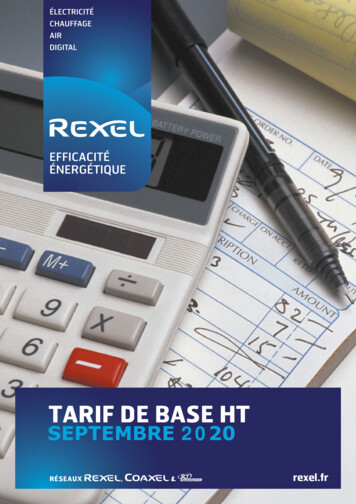
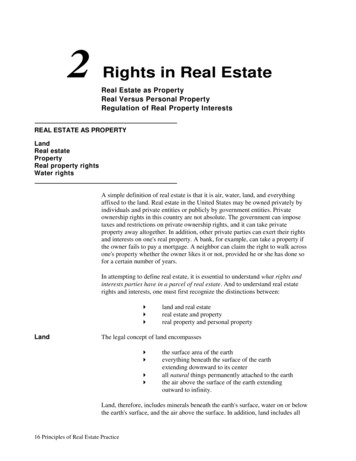
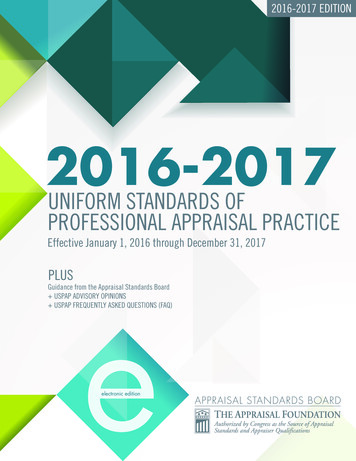
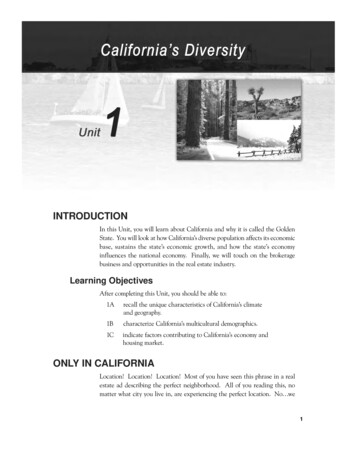


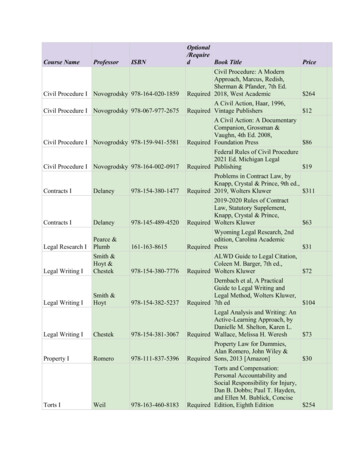
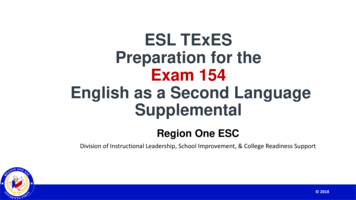

![Oracle Database 12c SQL : [Master SQL and PL/SQL]](/img/28/750948434.jpg)
